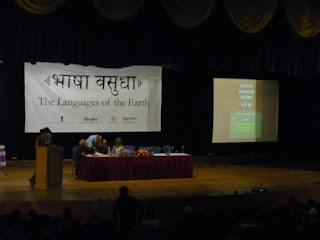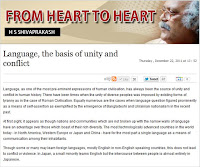[MLE] People’s Linguistic Survey of India Conference

Dear multilingual education friends, Earlier this months the People's Linguistic Survey of India (PLSI) conference took place. 900 delegates from all over the world gathered in Baroda to celebrate the progress on survey. A quote from the Lit-Ityadi report Anyone familiar with George Grierson's historic work, the Linguistic Survey of India , compiled nearly 100 years ago, will immediately note the similarities. What is different however, about the PLSI, is the notion of networking, now made by possible by modern methods of communication, that enables adivasi people from Orissa to dance shoulder to shoulder with Bhili tribesmen from Gujarat. This sense of solidarity was felt, not only between the Indian delegates, but also internationally as we heard from indigenous people from Papua New Guinea and various parts of Africa. A quote from the Times of India report This is...


